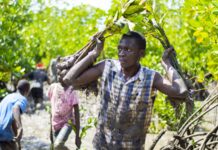
By Muthoki Kithanze
Nairobi, Kenya: Climate stakeholders from Africa have called for urgent inclusion of health in climate change policy as they criticized the Nairobi Declaration on Climate Change that neglected health prioritization.
“In the just concluded discussions on climate in Nairobi, the intersect of health and climate change was nowhere to be seen and this reflected where our key priorities are,” said Leah Aoko Policy Specialist and Research Associate at Africa Research and Impact Network (ARIN).
She further said that climate change was precipitating an increase in disease prevalence, malnutrition, and a rise in air pollution health complications which hurt vulnerable communities.
Leah was making the remarks during an expert webinar discussion series on bringing policy gaps between climate change and health organized by the Africa Institute for Development Policy (AFIDEP).
Hon Winnie Masiko from Uganda urged for the implementation of gender policies to boost the achievement of climate change action points.
“The economic empowerment component is important because it allows women to access health services or to become healthy. They might know and understand climate change issues but without economic empowerment, we may not achieve much,” she said.
She added that women’s economic empowerment should be at the forefront of driving climate adaptation and resilience for African countries.

“Women are the ones who buy water, or medicines women cannot adopt if they are not empowered,” she said.
It also emerged during the discussions that lack of information, weak political leadership on climate change and health nexus, and poor financing in the health component of climate change are hindering the prioritization of health.
“We need to look at increasing funding that will go to health for instance once the loss and damage fund becomes active we need to make it flexible so that it is used to alleviate health crisis,” said Prof Brame Kone, WHO.













